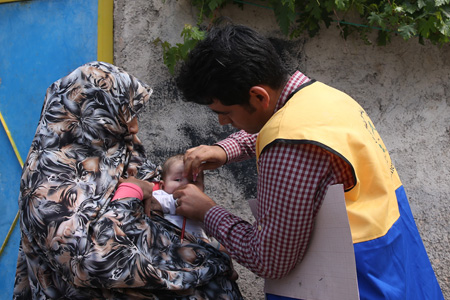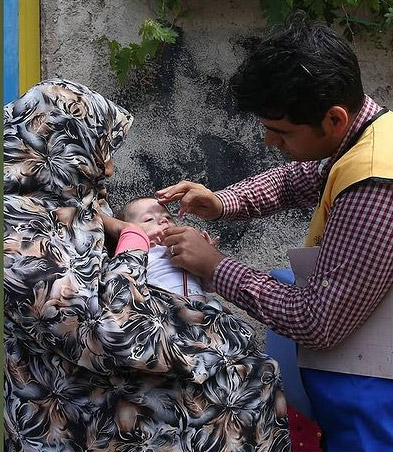 Our mission is to support the Ministry of Health and Medical Education to maintain a polio-free Islamic Republic of Iran by boosting immunity in children under-5 years of age and coverage of oral polio vaccines in the routine immunization programme, while continuing to support the search for polioviruses circulating in the human population and the environment.
Our mission is to support the Ministry of Health and Medical Education to maintain a polio-free Islamic Republic of Iran by boosting immunity in children under-5 years of age and coverage of oral polio vaccines in the routine immunization programme, while continuing to support the search for polioviruses circulating in the human population and the environment.
WHO provides support to the Ministry in:
- conducting mass vaccination campaigns in outbreaks;
- developing capacity of field staff;
- supporting national polio laboratories in containment (during collection, handling, and storage) of potentially infectious polio materials; and
- supporting the Ministry in implementing policies on poliomyelitis as required by the International Health Regulations (IHR 2005).
What we do

In line with its organizational mandate in health emergencies, the WHO country office ensures implementation of the following actions in order to strengthen emergency preparedness and ensure a timely and effective response.
Emergency preparedness and IHR capacity-building
The IHR (2005) are central within the WHO Health Emergencies Programme of the country office to guide country towards achieving common approaches and capacity standards in emergency preparedness and response. The WHO country office supports the country to monitor, evaluate, strengthen, and test its core capacities to cope with health emergencies. A great deal of work done by the WHO country office and Ministry of Health and Medical Education focuses on the interlinkages between health emergencies and health systems. By strengthening the core capacities of the IHR (2005), the country is improving its health system's resilience. Equally, development of responsive health systems is an integral part of IHR implementation enabling the health system to “build back better” as it prevents, prepares, responds to, and recovers from emergencies.
Infectious hazard management
WHE aims to ensure that Islamic Republic of Iran's health system has adequate capacity and strategies to prevent and control risks from high-threat infectious hazards. We support the Ministry to monitor health threats, strengthen disease surveillance systems, verify outbreak alerts and conduct field investigations to detect and contain outbreaks through the development of evidence-based strategies to predict, prevent, detect, and respond to infectious hazards. We also provide support in implementing mass immunization campaigns for vaccine-preventable epidemic diseases.
Health emergency information and risk assessment
WHE aims to strengthen all aspects of activities related to the systematic detection, verification and risk assessment of emergencies, including capacity building, training, coordination, and quality of information. Also, health emergency information and risk assessment includes all aspects of activities for the surveillance, investigation, and response monitoring of public health emergencies, including capacity-building, training, coordination and data management.
Emergency operations
WHE aims to ensure that emergency-affected populations have access to timely and effective health services, including essential packages and public health interventions. This includes ensuring effective and inclusive coordination mechanisms, joint assessments and planning by partners, implementation of operations and services according to agreed standards, and strong logistics and operational support. The expansion and strengthening of operational partnerships is a key priority.
External relations
WHE coordinates all activities related to resource mobilization, secure rapid and sustainable funding for the effective implementation of the emergency operations, donor relations, and advocacy to support the implementation of strategic, operational, and incident management action plans.
What we have achieved
- Stopped 2 outbreaks of circulating vaccine-derived polioviruses types 2 and 3 through 19 intense polio vaccination campaigns.
- Provided technical support for polio incident management in the southeast of Islamic Republic of Iran (CVDPV2).
- Enhanced quality of specific immunization campaigns during outbreaks by supporting and improving planning and monitoring of immunization campaigns and improving the quality of training offered to health workers.
- Provided support to the national plan for poliovirus surveillance among primary immunodeficiency patients.
- Ensured annual procurement of laboratory devices and supplies for the national polio laboratory.


